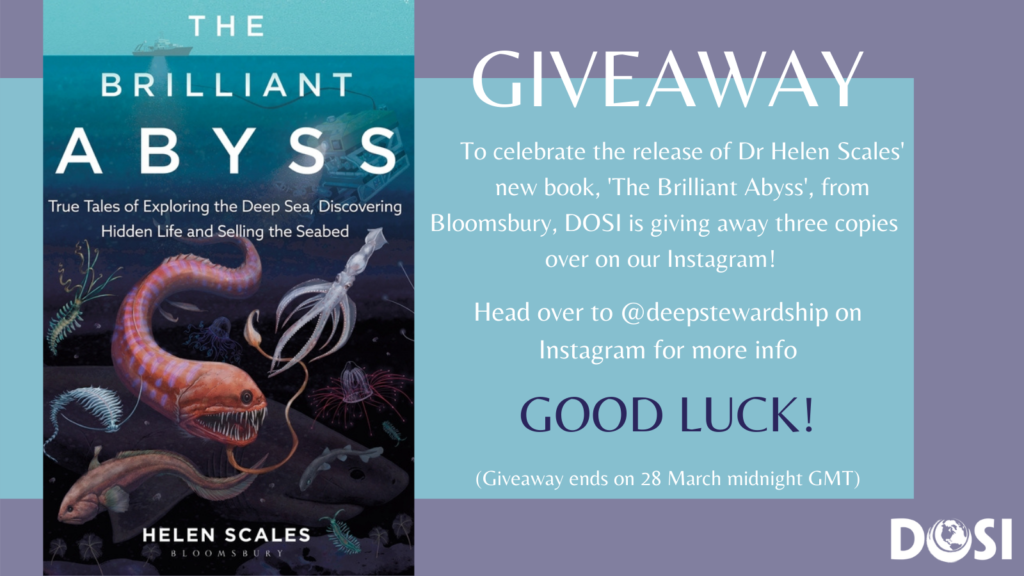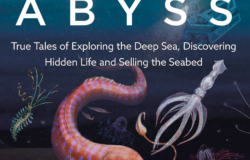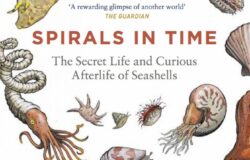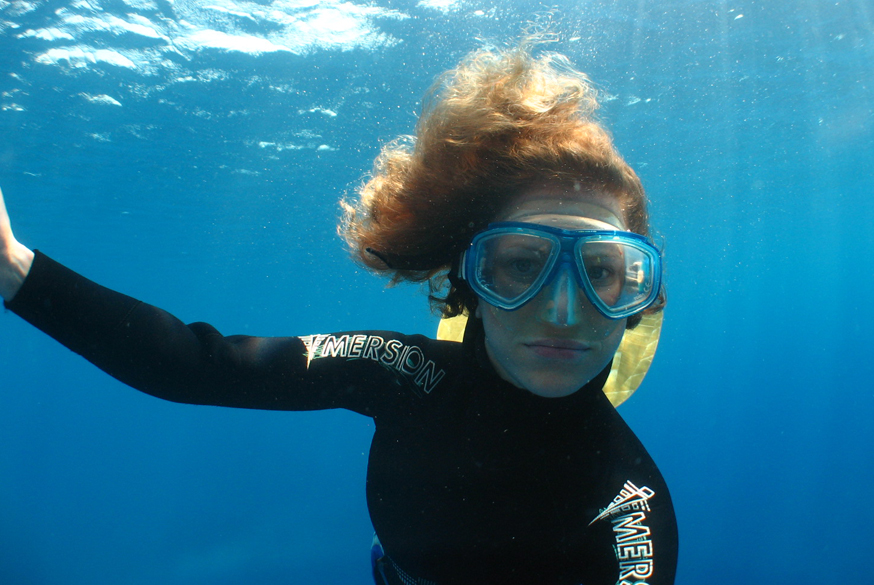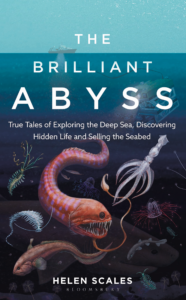Interview with Helen Scales
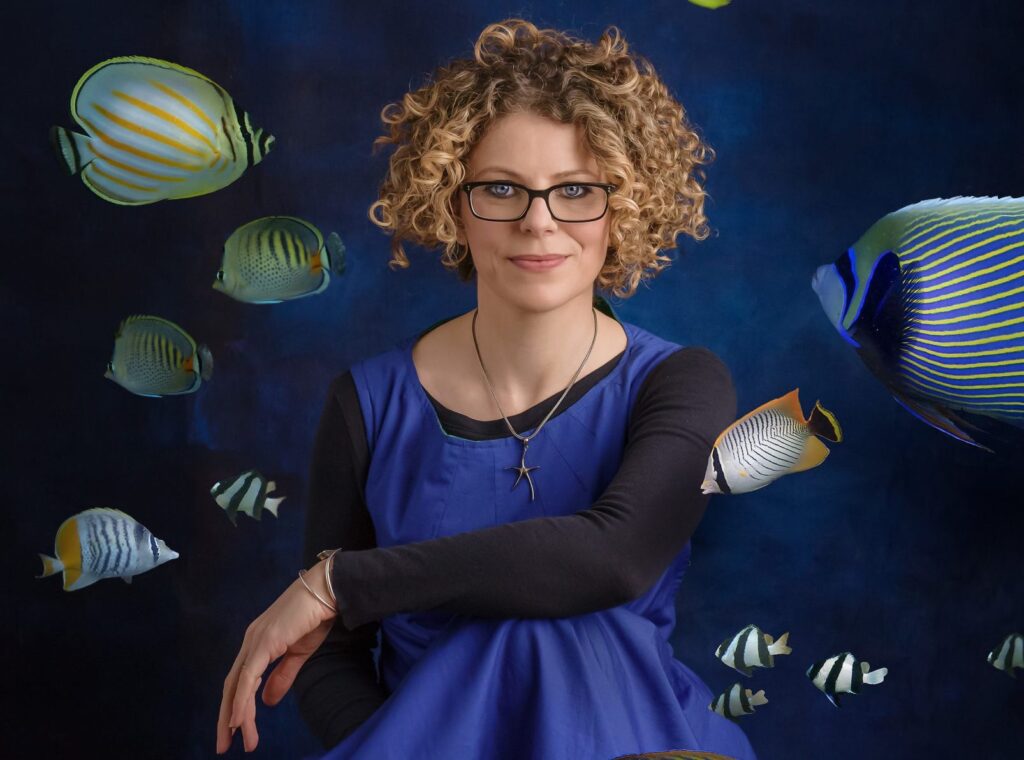
Portrait of Dr Helen Scales by Ria Mishaal
Dr Helen Scales is a marine biologist, writer and broadcaster who has written no less than seven books on the ocean to date, including the Guardian bestseller, Spirals in Time about the hidden wonders of seashells. The Brilliant Abyss, published in March 2021, is her latest book, and the first to focus on the vast and mysterious deep-ocean realm. Offering fascinating insights into life in the deep, from the octopus who bravely broods her young for five, long years to the “tangled forests of immobile life” on underwater mountains, Helen brings light to the deep ocean and helps share its extraordinary value – economical, ecological, societal and cultural – with the world.
As the publication date approached, DOSI sent Helen a few questions to find out more about her inspiration and motivation to champion the deep.
As a Marine Biologist whose PhD focussed on coral reef fish, and whose previous literary work has focussed broadly on the sunlit upper layers of the ocean, what motivated you to write your latest book, The Brilliant Abyss, about the deep ocean?
The living wonders of the deep ocean have been bubbling away in my mind ever since my days as a zoology student at Cambridge, when Professor Peter Herring told us about amazing animals like the stoplight loose jaw with its red light ‘night vision goggles’. Back then, I had set my mind set on becoming a coral reef biologist, partly as I saw these as some of the most threatened ecosystems in the ocean (and also, I can’t deny, because I love visiting them!). More recently, it was a similar motivation that inspired me to write about the deep ocean as I began to realise the deep isn’t the untouched, pristine wilderness that many people presume it to be, but it’s facing growing and worrying threats from human activities. Writing a book is my way of trying to share with people both the mind-blowing scientific discoveries taking place in the deep, while also uncovering the impacts and looming threats that are otherwise a long way out of sight and out of mind.
What do you think is the greatest threat to the deep ocean and why?
I think it depends somewhat on the timescale we’re thinking of. In the next decade or so, I think the most worrying and acute threats are likely to come from mineral extraction from deep-sea mining, as well as bottom trawling, which is already happening. Both involve the physical disruption and removal of important habitats, which will take a long time to recover, if at all.
But even if we do manage to minimise or stop those threats, it’s also becoming obvious that the impacts of climate change will continue for decades and centuries. A trio of worsening effects will push deeper – acidified water, excess heat and loss of oxygen – causing immense disruption to the life-supporting roles the deep ocean plays on a planetary scale.
What characters inspired you most during research for, and the writing of, The Brilliant Abyss (humans and/or animals)?
I began researching and writing the book in earnest around the time of the Deep-Sea Biology Symposium in 2018, where I was immensely inspired by the biologists I met and who gave talks all week long, ranging from the grad students just starting out, all the way up to the professors who’ve devoted their careers to studying the deep ocean. It’s impossible to pick out one person from this impressive community of scientists, although I would say it’s wonderful to see so many women involved in deep ocean science.
Can effective communication help humans become better stewards of the deep ocean?
I do hope so. Good stewardship of any part of the living planet has to stem from knowledge and understanding of what’s there, and a good grasp of how things are interlinked and why they matter. When it comes to the deep ocean, the perpetual challenge is bringing this remote, unseen place into people’s minds, which makes good communication all the more important in all its many forms. Ultimately, we need as many people as possible to respect and care about the deep ocean and what happens to it, and to get excited about the discoveries being made there.
What advice would you give to early career researchers, or even experienced scientists, looking to convey important science to the general public?
Two things I think can really help with successful science communication. Firstly, is the passion you have for your science and research. Spend some time thinking about what it is that excites you about what you do, and why you’re doing it. What are the details you love telling people, especially people who know nothing about your area of science? Find ways of tapping into that passion and sharing your excitement for your subject.
Second, practise on your friends and family. It can be a friend over zoom, over a coffee or a pint (when that’s allowed!), your granny, your 5-year old niece, anyone who will listen. Your aim is to get them hooked on what you have to tell them, so they keep asking questions and want to know more. This will work for spoken-word communication, for talks and lectures, as well as writing. You can test out ideas and tell stories that will work on the page too.
Your books are synonymous with striking artwork. How might art and science collaborate to raise awareness of the deep ocean, and improve deep-ocean literacy?
It’s difficult for people to fall in love with facts. The arts can help forge emotional connections to science, be that visual art, music, film and other forms of storytelling. It works in the other direction too. Science offers artists ideas to engage their audiences with, and inspiration from a constant stream of discoveries and new ways of seeing the world. I’d love to see many more collaborations unfolding between artists and deep-ocean scientists to explore this interchange of knowledge and creativity.
If you could choose, what key outcome would you hope to see delivered during the United Nations Decade of Ocean Science for Sustainable Development?
It would be a powerful and hopeful move forwards for the ocean if we could see 30 per cent fully protected by 2030, with the remaining 70 per cent being sustainably managed. That target is still a long way off being achieved, but with the increased focus on the importance and understanding of the ocean, this the decade to get it done.
Which of the ten DOSI topics (working groups) are you most interested in and why? Oh, that’s a tough one! (Almost as difficult as “Which is your favourite deep-sea species?”). All the topics are tremendously important but if I stick to your question of what I find most interesting, then I guess my pick is the New technologies for environmental impact assessments in the deep sea. Researching and writing my book, I’ve become more of a tech nerd than I used to be, as I’ve seen how technologies are offering exciting new ways of studying and understanding the deep ocean. And it’s going to be especially interesting to see how cutting-edge tools will be applied to critical questions of how the impacts of human activities can be traced, understood and minimised or avoided altogether in the deep ocean.
How can we get people to care more about the management of our deep ocean? We need to find ways of helping people grasp that the deep ocean is not just this remote place that’s disconnected from our lives on land, but it is vital for all of life on earth. Even the idea that the deep ocean can be managed may come as a surprise to many people who might assume it’s too vast and too distant for that. We’re also living through a time when the issue of global inequality is increasingly visible, and this can even reach into the deep ocean. The questions of how the deep ocean is explored, exploited and managed and who benefits directly and financially from its great riches are all hugely relevant, and need to be spoken about and debated as widely as possible.
What have you got lined up next? More deep-ocean spotlighting we hope!
Right now, I’m working on two more children’s picture books. I can’t tell you the exact topics just yet, but I can say that they will both feature the deep ocean.
THE BRILLIANT ABYSS WILL BE PUBLISHED ON THURSDAY 18TH MARCH. GET 20% OFF RRP WITH CODE SEA20. Click image below to pre-order/buy.

